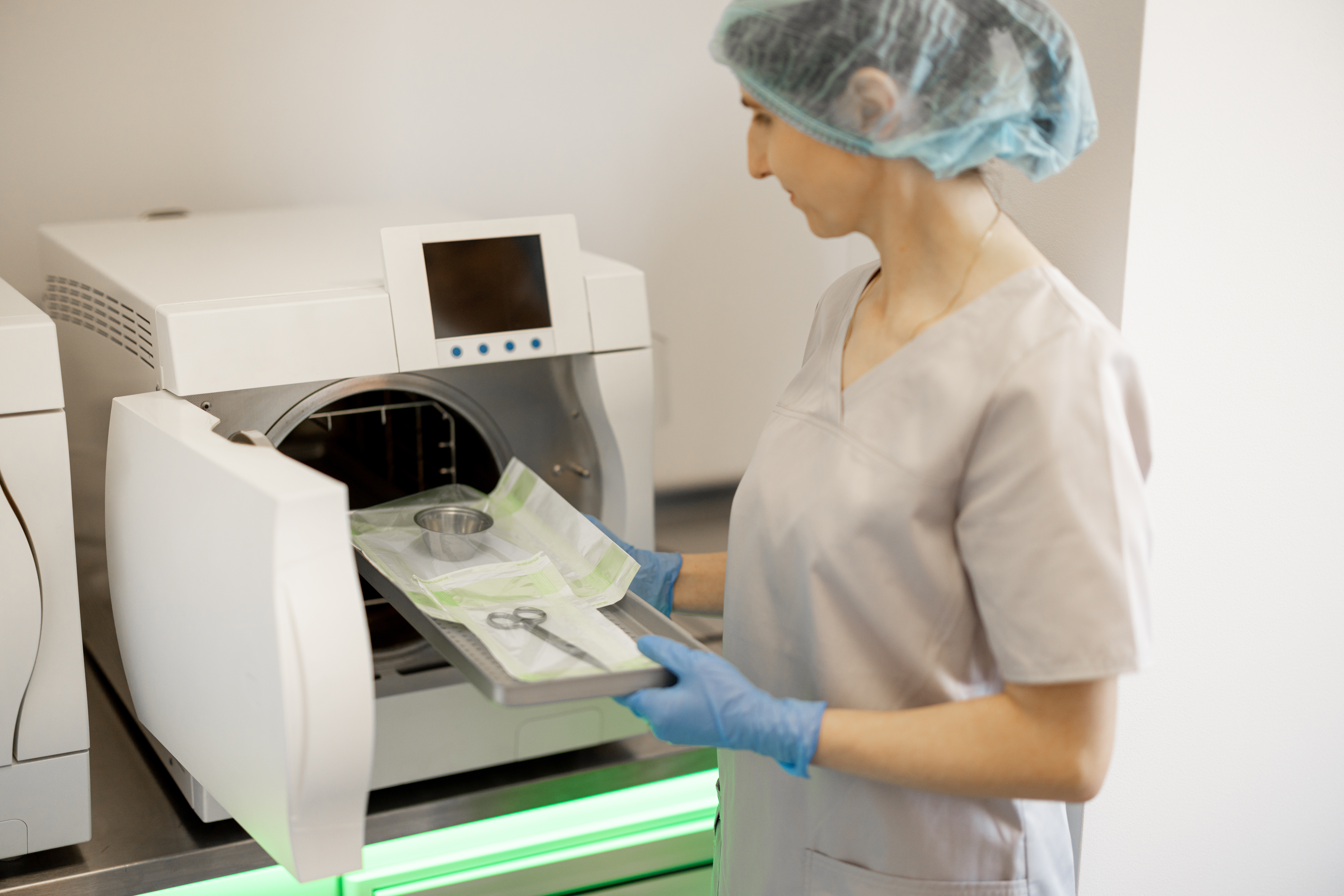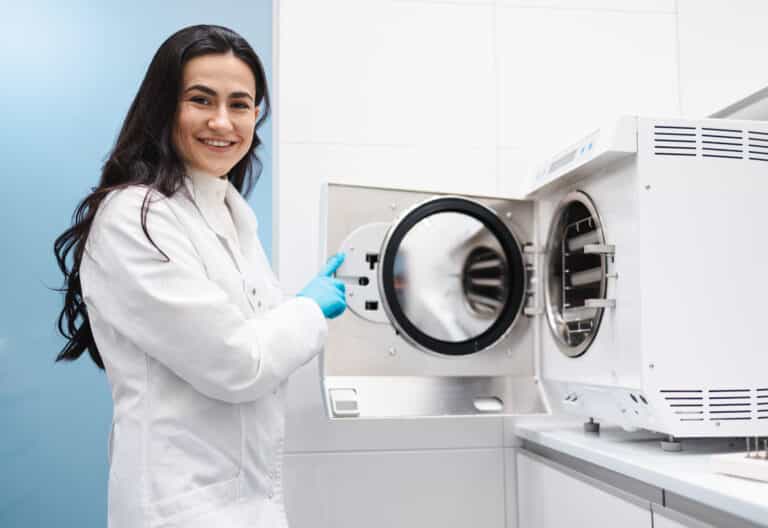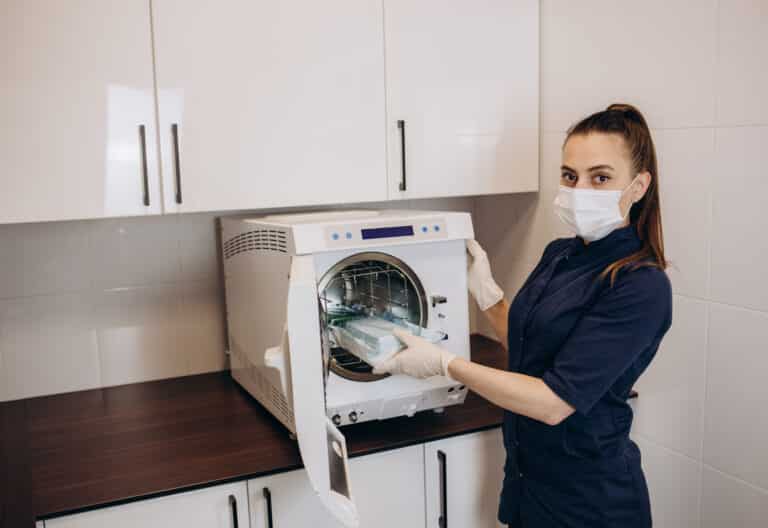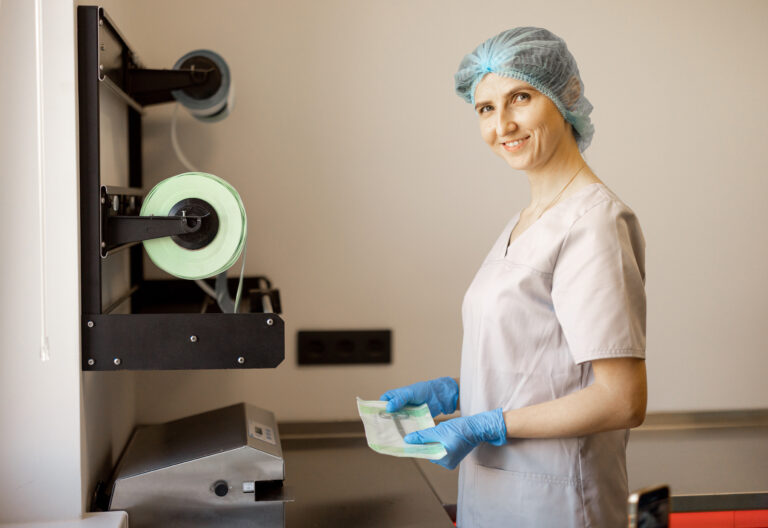Do you want to become a Sterile Processing Technician?
If yes then you must have been wondering about the money that would cost you to enroll in a Sterile Processing Technician training program.
Well, in this article, we’re going to discuss about the different types of Sterile Processing Technician Training Programs, their costs, factors affecting the costs, which type of training program is recommended, what exactly to avoid and look for in a training program, and much more.
Moreover, we’ll also talk about a Sterile Processing Technician Training Program that makes you job-ready faster in as little as 4 months.
Stay tuned!
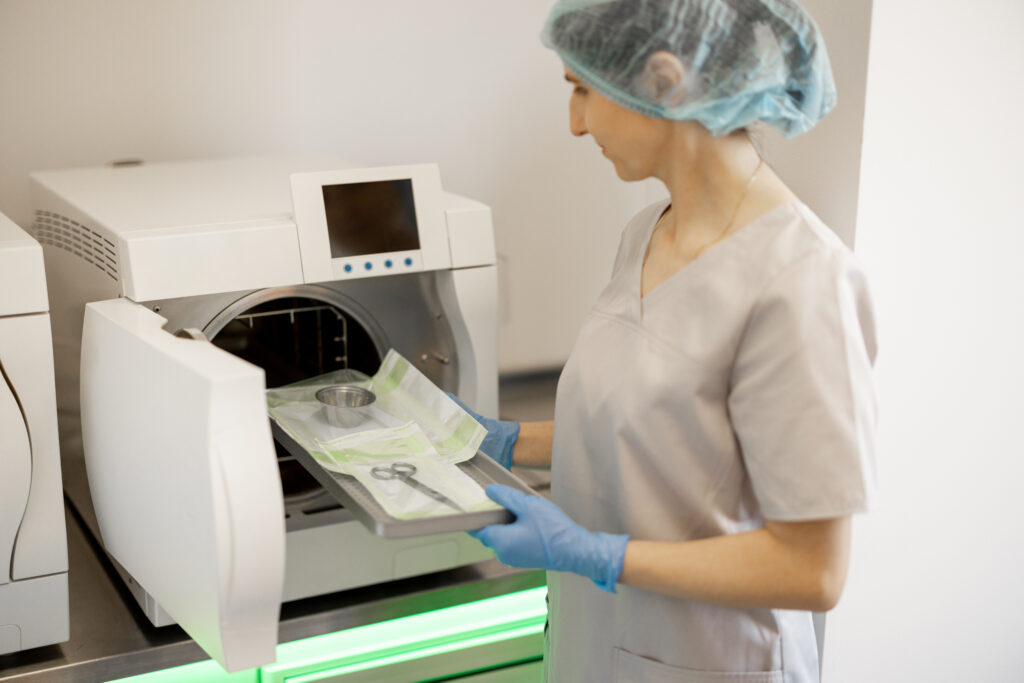
Types of Sterile Processing Technician Training Programs
If you’re considering a career as a Sterile Processing Technician, understanding the different types of training programs available is essential.
Each type of program offers unique advantages and caters to different needs and circumstances.
Read:
-> What is a Sterile Processing Technician?
-> What Does a Sterile Processing Technician Do?
Here are the 3 main types of Sterile Processing Technician Training Programs:
Associate Degree Program
Associate degree programs are offered by technical universities and colleges. They provide a comprehensive education that combines both theoretical knowledge and practical experience.
They typically take about two years to complete.
Many students opt for associate degree programs because they offer a well-rounded education and are often seen as a more prestigious qualification.
These programs are ideal for those who are looking for an in-depth understanding of the field and are willing to invest more time in their education.
In an associate degree program, students will cover a wide range of subjects, including microbiology, infection control, sterilization techniques, and management of sterile processing departments.
The curriculum typically includes electives or general education courses such as mathematics, English, and science, which help in developing a well-rounded skill set.
Practical experience is a significant component of these programs, providing students with hands-on training in a lab setting, or in some cases, in a real-world healthcare setting.
This experience is invaluable, allowing students to apply their knowledge under the supervision of experienced professionals.
Certificate Program
Certificate programs usually take about one year or 12 months to complete. They are offered by community colleges and trade schools and are designed to provide focused, intensive training.
Students often prefer certificate programs because these programs are available close to them and take less time compared to an Associate degree.
The curriculum of certificate programs covers the core topics essential for a career as a Sterile Processing Technician, such as decontamination, sterilization, and infection control.
These programs are more streamlined than associate degree programs, with a stronger emphasis on the technical skills needed for the job.
Hands-on training is also a critical component, ensuring that students gain practical experience.
This training is often completed through externships or internships, where students work in healthcare settings and apply their skills under professional supervision.
Online Program
Online training programs can be completed within a few months, typically ranging from four to six months. Accredited institutions offer these programs and provide a flexible and convenient way to gain the necessary qualifications.
The curriculum of online programs covers all the essential topics, such as sterilization techniques, infection control, and the use of sterilization equipment.
Online training programs are increasingly popular. They are ideal for individuals who have other commitments, such as work or family, and need a program that fits around their schedule.
Additionally, students can access their coursework at any time, providing flexibility and convenience. Plus, the lower cost of online programs makes them an attractive option for many students.
Online programs offer a comprehensive education in sterile processing, including virtual simulations and interactive learning tools.
These tools help students develop their skills in a simulated environment. Some programs also include externship opportunities, allowing students to gain hands-on experience in a healthcare facility near their location.
Read:
-> Sterile Processing Technician Requirements
-> How to Become a Sterile Processing Technician?
Cost of an Associate Degree

Pursuing an associate degree in sterile processing technology is one of the pathways to becoming a sterile processing technician.
While it offers comprehensive training and a well-rounded education, it’s essential to understand the associated costs and consider whether this option aligns with your personal and financial circumstances.
Cost of this program
The cost of an associate degree in sterile processing technology can vary widely depending on the institution and location. On average, tuition fees for these programs range from $10,000 to $30,000.
This estimate includes public community colleges, which tend to be on the lower end of the spectrum, and private colleges, which are typically more expensive.
Factors for This Expensive Cost
Several factors contribute to the cost of an associate degree in sterile processing technology:
Tuition Fees
The primary expense is the tuition fee, which varies by institution. Public colleges generally offer lower tuition rates compared to private institutions.
Books and Supplies
Textbooks, lab materials, and other supplies required for the coursework can add a significant amount to the overall cost. These expenses can range from a few hundred to several thousand dollars over the duration of the program.
Lab Fees
Many programs include lab-based training, which may require additional fees for the use of specialized equipment and materials.
Administrative Fees
Colleges often charge various administrative fees for registration, technology, student services, and other campus facilities.
Living Expenses
If the college is not within commuting distance, students may need to consider the cost of housing, food, transportation, and other living expenses. These can substantially increase the overall cost of education.
Also Read:
-> Sterile Processing Technician Course
-> Sterile Processing Technician Schools
-> Sterile Processing Technician Certificate Program
Why an Associate Degree Might Not Be the Best Choice?
While an associate degree offers a comprehensive education and valuable hands-on experience, it might not be the best choice for everyone due to several reasons:
Expensive Tuition Cost
The high tuition fees associated with associate degree programs can be a significant financial burden. When combined with other costs such as books, supplies, and administrative fees, the total expense can become overwhelming. Many students rely on student loans to cover these costs, which means starting their careers with substantial debt.
Added Expenses
Beyond tuition, there are numerous additional expenses to consider. Transportation costs, whether it’s gas for commuting or airfare for relocating, can add up quickly.
If the college is far from home, the cost of living, including rent, utilities, and groceries, can significantly increase the financial burden.
Student Loans
To afford the high costs of an associate degree, many students take out student loans. While loans can make education more accessible, they also mean that graduates start their careers with debt that must be repaid, often over many years. This debt can be a heavy financial burden, impacting financial stability and career choices.
Commuting and Scheduling
Attending a full-time, on-campus program requires regular commuting to classes, which can be time-consuming and costly. The fixed schedule of classes can also be challenging for those with other responsibilities, such as part-time jobs or family commitments. This lack of flexibility can make it difficult to balance education with other aspects of life.
Not Adult-Friendly
Full-time associate degree programs are often designed for traditional students who can dedicate their time solely to education. This can make them less suitable for adults who have other responsibilities, such as working full-time, caring for children, or supporting elderly family members. The rigid structure and scheduling of these programs can be difficult for adults to manage.
To summarize
While an associate degree in sterile processing technology provides a thorough education and valuable hands-on experience, the high costs and additional expenses make it a less feasible option for many prospective students.
The financial burden of tuition, coupled with living expenses and the need for student loans, can make this pathway challenging.
Moreover, the rigid scheduling and commuting requirements are not conducive to adults with other responsibilities.
Cost of Certificate or Diploma Sterile Processing Technician Programs

Certificate or diploma programs are popular alternatives to associate degrees for those seeking a career as a sterile processing technician.
These programs typically offer a more focused and quicker route into the profession. However, like all educational paths, they come with their own set of costs and potential drawbacks.
Cost of This Program
The tuition fees for certificate or diploma programs in sterile processing typically range from $5,000 to $8,000. This is significantly lower than the cost of associate degree programs, making it a more affordable option for many students.
Factors for This Cost
Several factors contribute to the cost of certificate or diploma programs:
Length of Program
These programs are shorter in duration, often taking 6 to 12 months to complete, which helps keep overall costs down.
Institution Type
Community colleges and trade schools, which typically offer these programs, generally have lower tuition fees compared to universities.
Location
The cost can vary depending on the geographic location of the school, with programs in urban areas potentially costing more than those in rural areas.
You May Also Like:
-> Sterile Processing Technician Salary
-> Sterile Processing Technician Resume
-> Sterile Processing Technician Job Description
Why Certificate or Diploma Programs Might Not Be a Good Choice?
Despite being more affordable, certificate or diploma programs come with their own set of challenges that might make them less desirable for some students.
Unaccredited Programs
One significant risk is that some certificate or diploma programs might not be accredited.
Accreditation is crucial as it ensures the program meets certain educational standards and is recognized by employers and certification bodies.
Graduating from an unaccredited program can limit job opportunities and hinder career advancement.
High-Cost Relative to Benefits
While cheaper than associate degree programs, the cost of $5,000 to $8,000 is still substantial. For this investment, students need to ensure they are getting a quality education that will lead to employment.
In some cases, the return on investment might not be as high as expected, especially if the program does not provide adequate training or job placement support.
Employer Perception
The value of a certificate or diploma can vary widely depending on where it is obtained. Programs offered by well-known, accredited institutions are generally respected by employers.
However, certificates from lesser-known or unaccredited community colleges or trade schools might not carry the same weight, potentially affecting job prospects.
Limited Scope
Certificate or diploma programs typically offer a narrower scope of education compared to associate degree programs. While this can be an advantage in terms of focusing on relevant skills, it might also mean that students miss out on broader educational opportunities that can be beneficial in the long term.
To Summarize
While certificate or diploma programs in sterile processing offer a quicker and more affordable path into the profession, they come with potential drawbacks such as accreditation issues, varying employer perception, and a potentially lower return on investment.
It is essential for prospective students to thoroughly research and choose a reputable, accredited program to ensure they receive a valuable education that will lead to successful employment.
Cost of Online Sterile Processing Technician Programs
In the rapidly evolving field of healthcare, becoming a sterile processing technician (Sterile Processing Technician) is a promising career choice. Among the various educational paths available, online programs have emerged as a highly recommended option. They offer flexibility, affordability, and speed, making them particularly attractive to many aspiring Sterile Processing Technicians.
Cost of this Program
The cost of online sterile processing technician programs is generally much lower compared to traditional on-campus programs.
On average, tuition fees for online Sterile Processing Technician programs can be up to $3,000. This is significantly less expensive than both associate degree programs and certificate/diploma programs offered by community colleges and universities.
Possible Reasons for The Low Cost
Several factors contribute to the lower cost of online Sterile Processing Technician programs:
Reduced Overhead
Online programs typically have lower operational costs. They do not require physical classrooms, campus facilities, or extensive administrative staff, which helps in keeping the tuition fees low.
Digital Resources
Online programs make extensive use of digital resources and materials, which can be more cost-effective than traditional textbooks and physical learning aids.
Self-Paced Learning
Many online programs offer self-paced learning, allowing students to complete courses at their own speed, potentially reducing the overall time and cost of the program.
No Commuting Costs
Students save on commuting, parking, and other associated costs of attending an on-campus program.
Also Read:
-> Certified Sterile Processing Technician
-> Sterile Processing Technician Certification
Why This Is the Recommended Choice?

Online Sterile Processing Technician programs offer several advantages that make them the preferred choice for many students:
Affordable Pricing
The lower tuition fees make online programs more accessible to a broader range of students. By reducing financial barriers, more individuals can pursue a career as a Sterile Processing Technician without incurring significant debt.
Adult-Friendly and Flexible
Online programs are particularly well-suited for adult learners who may have other responsibilities such as work, family, or caregiving.
The flexibility to study at one’s own pace and on a schedule that fits their lifestyle is invaluable. This adaptability ensures that even those with busy lives can achieve their educational goals.
Faster Completion
Online programs are designed to be completed more quickly than traditional on-campus programs.
While associate degrees might take up to two years and certificate programs up to a year, many online Sterile Processing Technician programs can be completed in as little as 4 to 6 months.
This accelerated pace allows students to enter the workforce sooner and start gaining valuable experience.
Quality and Accreditation
Many reputable online programs are offered by accredited institutions, ensuring that the education provided meets industry standards.
These programs are designed to prepare students for certification exams and the demands of the job, providing both theoretical knowledge and practical skills.
To Summarize
Online sterile processing technician programs represent an affordable, flexible, and efficient way to enter the healthcare field.
With significantly lower costs, the convenience of self-paced learning, and the ability to complete the program quickly, aspiring Sterile Processing Technicians can balance their education with other life responsibilities and start their careers without the burden of significant debt.
This makes online programs the recommended option for many who are looking to become sterile processing technicians.
What to Avoid and What You Need in an Online Program?
Choosing the right online program for becoming a Sterile Processing Technician is crucial for your future career.
While the flexibility and convenience of online programs are appealing, not all programs offer the quality education and support needed to succeed in this field.
Here are some key aspects to avoid when selecting an online Sterile Processing Technician program.
Avoid Unaccredited Random Programs
Accreditation is a critical factor in ensuring that the program meets industry standards and provides a recognized qualification.
So you should avoid programs that are not accredited by a reputable accrediting body.
Without accreditation, employers might not value your certificate, and you may face difficulties in getting certified or finding a job.
Avoid the Hybrid Models
While hybrid models that combine online and in-person learning can offer some benefits, they may not be as convenient or flexible as fully online programs.
The requirement to attend physical classes or labs can negate the primary advantages of online learning, such as flexibility and the ability to learn at your own pace.
Avoid Unclear Pricing
Transparency in pricing is essential to avoid unexpected costs. Be wary of programs that do not provide clear information about tuition fees, additional costs for materials, or other hidden expenses.
So you should ensure you understand the total financial commitment before enrolling.
Now, let’s discuss what you need in an online program. Besides the basic things like accredited, self-paced education, faster finish, and affordable pricing, your program should –
Must Offer Externship Opportunity
Externships provide real-world experience and are often a requirement for certification. And that experience is a vital part of Sterile Processing Technician training.
So you should avoid programs that do not include externships or practical training components.
Must Make You Ready for the Certification Exam
The ultimate goal of a Sterile Processing Technician program is to prepare you for the certification exam. Avoid programs that do not have a strong focus on exam preparation.
So you should look for programs that include comprehensive review materials, practice exams, and other resources to help you succeed in getting certified.
Must Deliver Round-the-Clock Support
Online learning can sometimes be challenging, especially if you need help understanding certain concepts or navigating the coursework.
So you should avoid programs that do not offer 24/7 support. Having access to instructors, tutors, and technical support at any time can significantly enhance your learning experience.
Now, the big question here is – Does There Exist Any Online Program That Ticks All the Right Boxes?
Yes, there is.
Preppy’s Sterile Processing Technician program is designed to meet all the criteria for quality education in this field.
Preppy’s Sterile Processing Technician Program

Preppy’s program offers a comprehensive education that is fully online, accredited, and designed to prepare you for certification.
Here are some of its key features:
100% Online, Self-paced
Preppy’s program is 100% online, and self-paced allowing you to complete the coursework at your own pace.
This flexibility is particularly beneficial for adults who have other responsibilities, such as jobs or family obligations, making it easier to balance your education with your life.
Externship Opportunities
One of the standout features of Preppy’s program is the inclusion of externship opportunities at a healthcare facility near you.
These real-world experiences are crucial for gaining real-world skills and meeting the practical requirements for certification.
Certification Exam Ready
The program makes you ready for certification exams, such as the Certified Registered Central Service Technician (CRCST) exam.
This is vital for ensuring that you are ready to pass the exam and become certified, a key requirement for employment in many healthcare facilities.
Faster Finish
The program doesn’t take years to complete. You can enroll today, finish the coursework, and in as little as 4 months you could become job-ready for the career.
Affordable Pricing
Preppy’s Sterile Processing Technician program is insanely affordable, costing you just $1599, and that’s all-inclusive. This affordability makes it accessible to a broader range of students and helps prevent the financial burden associated with traditional full-time programs.
Bonus
At the time of crafting this article, there is an ongoing bonus offer where you can get a free laptop to aid your studies. This laptop is yours to keep even after you finish the course.
24/7 Support
Preppy offers round-the-clock support, ensuring that you have access to instructors, tutors, and technical assistance whenever you need it. This support can significantly enhance your learning experience and help you overcome any challenges you encounter during the program.
So, if you are looking to become a Sterile Processing Technician, then Preppy’s Sterile Processing Technician Certification Program is an excellent choice. Preppy offers everything you need to start your career on the right foot.
Conclusion
We hope this article could enlighten you about the different types of Sterile Processing Technician Training Programs and their costs.
This must have helped you to decide on which training program suits you based on your finances and career goals.
Ultimately, if you want to become a Sterile Processing Technician faster, then choose Preppy. Our program offers everything you need to succeed in the field of sterile processing technology.
RELATED:
-> Sterile Processing Technician Exam
-> Travel Sterile Processing Technician
-> Sterile Processing Technician vs. Surgical Technologist
-> How Long Does it Take to Become a Sterile Processing Technician?
